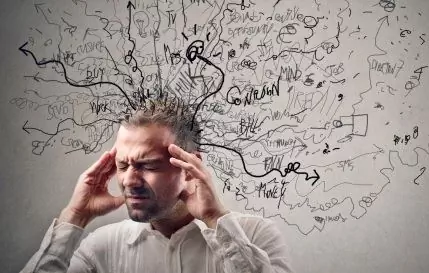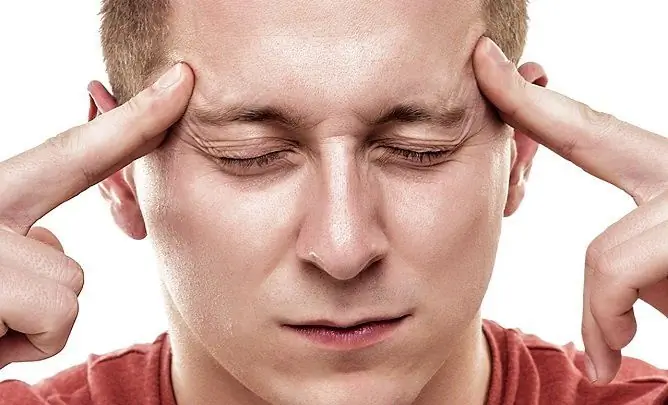- Author Rachel Wainwright wainwright@abchealthonline.com.
- Public 2023-12-15 07:39.
- Last modified 2025-11-02 20:14.
Psychological stress

Psychological stress is a consequence of a strong nervous overstrain, which was caused by any experience. Any emotions, both positive and negative, lead to such a reaction of the body, since they are accompanied by special physiological processes, for example, the release of substances into the blood that affect the work of internal organs.
Features of psychological stress
Psychological stress differs from biological stress in a number of features, among which the following can be distinguished:
- It is triggered by both real and probable events, the occurrence of which the subject fears. Man, unlike animals, is able to react not only to the current danger, but also to its threat, or a reminder of it;
- It is of great importance to assess the degree of participation of the subject in influencing the problem in order to neutralize it. With an active life position or the realization that the stress factor can be influenced, the predominantly sympathetic section is excited, and the subject's passivity in this situation leads to the predominance of parasympathetic reactions.
Another feature of psychological stress lies in the method of measuring it, which is aimed at assessing not indirect indicators (stressors, manifestations of depression and anxiety, frustration), but directly describes the state of the person experiencing the situation. This is a special scale of psychological stress PSM-25, which measures stressful feelings by emotional, behavioral and somatic characteristics.
Psychological mechanisms of stress
Since stress is an adaptive response, many body systems are involved. There are two groups of stress mechanisms: physiological (humoral and nervous) and psychological.
The subconscious attitudes that arise in response to the action of a stressor refer to the psychological mechanisms of stress. They protect the human psyche from the destructive effects of negative factors. These include:
- Suppression. This is the main mechanism that underlies many others and represents the repression of feelings and memories into the subconscious, as a result of which a person gradually forgets about an unpleasant situation. However, this mechanism is not always useful, for example, it often leads to forgetting previously made promises;
- Projection. When a person is dissatisfied with his own actions or thoughts, he projects them onto the people around him, attributing similar actions to them. Otherwise, it is a self-justification mechanism;
- Regression. This is an attempt by the subject to escape from reality, when he becomes helpless, indifferent, cannot draw logical conclusions and make any decision. It is possible that the posture of the embryo, which is characteristic of a person at the moment of intense experience, is explained by precisely this psychological mechanism of stress;
- Rationalization. This is another way of self-justification, which consists in finding the culprit in the situation. Rationalization leads to the inability of a person to analyze mistakes and blame his neighbors, spouse, boss or teacher for his troubles;
- Sublimation. This is the most beneficial stress response, effective both subconsciously and in real life. Sublimation consists in transforming unacceptable behavior (for example, aggression) into the framework of socially acceptable (boxing, professional competitions, sports games).
As you can see, the psychological mechanisms of stress are not always harmless and sometimes do not allow a correct assessment of the situation. Moreover, they sometimes harm relationships with others, thereby exacerbating the stressful effect of the problem on the body.
Psychological consequences of stress
Experiences and negative emotions caused by psychological stress are very dangerous, as they lead to the formation of foci of stagnant excitement in the brain, and this, in turn, contributes to the development of psychosomatic, neuropsychic and other diseases.
The psychological consequences of stress include:
- Anxiety and worry;
- Memory impairment;
- Decreased attention;
- Excessive emotionality for minor reasons;
- Periods of depression;
- Attacks of anger;
- Hot temper and irritability;
- Constant feeling of dissatisfaction;
- Capriciousness;
- Depression and depression;
- Subjective feeling of being overwhelmed;
- Loss of interest and apathy.
As a result, a person often tries to artificially compensate for the feeling of internal dissatisfaction: he begins to use drugs and alcohol, overeats, smokes more often, changes his sexual behavior, commits rash and impulsive acts, is fond of gambling, etc.
If a person has the listed psychological consequences of stress (at least half of them), it is necessary to carefully analyze his condition and current situation, and if the diagnosis is confirmed, immediately begin treatment using existing methods.
Relief of psychological stress
When assessing the scale of psychological stress, the integral (final) indicator of mental tension, or PPI, is important. If it is 100 - 154 points, then they talk about the average level of stress, but when the PPI is more than 155 points, this is a high level. It indicates mental discomfort and a state of maladjustment. In this case, the removal of psychological stress and emotional stress is of great importance.
To activate and then release emotions, deeper breathing is required: inhalation must be accompanied by a slow exhalation. In this case, you should pay attention to the sensations that arise in the body.
The following exercise helps to calm down quickly: take a slow breath through your nose, then hold your breath for 1-2 seconds and slowly exhale through your mouth. At the same time, the face and body should be relaxed. You can shake your arms and legs to relieve stress.
In relieving psychological stress and its prevention, friends and relatives provide invaluable help, allowing a person to speak out and throw out the accumulated emotions. An equally effective and efficient means of dealing with nervous tension is keeping a personal diary.

Any physical activity relieves stress very well: sports, household chores, walking or morning jogging. Exercise and housekeeping distract from negative situations by channeling thoughts in a more pleasant direction.
Another way to relieve psychological stress is through creativity, music, singing, or dancing. Creativity allows you to distract yourself, music affects the emotional state, dancing helps to relieve unnecessary stress, and singing is a means of self-expression and a natural regulator of breathing.
When you get into stressful situations, you need to come out of them as a winner, who has overcome another obstacle on the difficult path of self-development.
Found a mistake in the text? Select it and press Ctrl + Enter.






